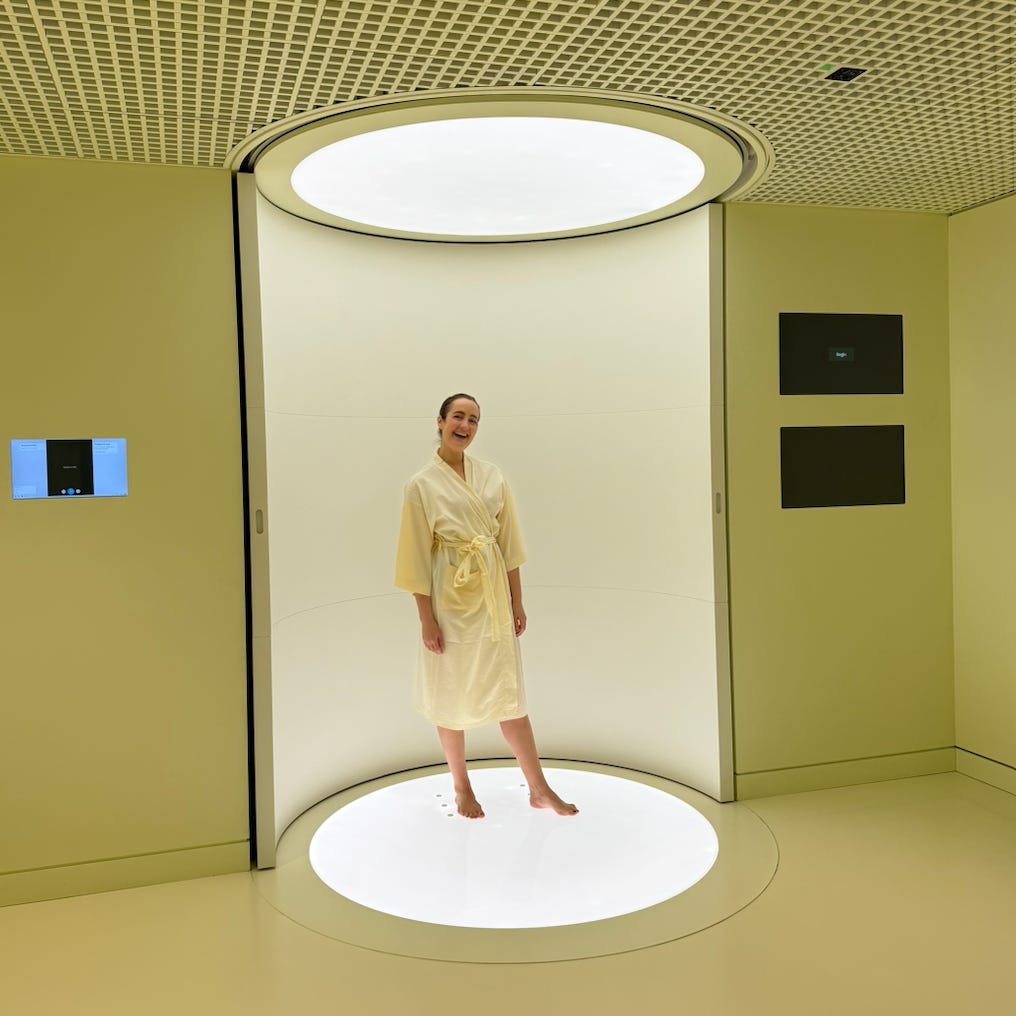Are personalised health tests worth the money?
The future of healthcare, or the emperor’s new clothes?
This decade has seen a proliferation of personalised health clinics, offering tests that you won’t get as standard on the NHS, and providing detailed individualised advice.
They vary widely on the scale of pricing and what they offer.
Last year, I trialled Viavi, a high-end clinic billed as “pioneers in healthy longevity.” They test for everything from cellular health to genetic mutations that may increase the risk of certain types of cancer. They sampled every one of my bodily fluids and provided extremely detailed feedback on my fitness levels, stress responses, heart health, brain function, nutritional deficiencies and the state of my gut and oral microbiomes. I was writing about it for The Sunday Times but, had I been paying as a normal punter, the whole shebang would have cost £14,000.
Earlier this month, I tried Neko, the full body scan from Spotify co-founder Daniel Ek. Here, you are whisked through a series of tests including skin mapping, blood pressure, eye pressure, grip strength, and a blood test for levels of cholesterol, neutrophils, haemoglobin and inflammatory markers. I was in and out within an hour, and the price is £299.
There are plenty of other options. Echelon is another top-end clinic offering preventative health assessments tailored to each individual’s needs. Like Viavi, the platinum package is a punchy £14,000. (The programmes at these luxury clinics are tailored to your medical history and concerns, so may include scans like MRIs, too.)
Elsewhere there is Stride, founded by former Olympic medalist Andrew Steele, which offers an array of at-home tests for things like methylation profile and nutrigenetic reports, with prices ranging from £199 to £698. And, this month, wellness platform Healf has launched a beta version of Healf Zone, an at-home blood test for personalised nutrition advice.
But is there actually any benefit in forking out for these clinics, if you’re an average healthyish person?
Well, the expensive ones test your genes so if, for instance, you found that you carried the BRCA1 genetic mutation, then you might choose to have preventative surgery, like Angelina Jolie. In my case, the genetic tests came back clear, which was reassuring.
But my other results (weak muscles, poor stress resilience, high LDL cholesterol) led to recommendations of strength training, mindfulness meditation and eating a Mediterranean diet - stuff we all know we ought to be doing.
Perhaps a person is more likely to follow this advice if they feel it is prescribed specifically for their needs, rather than (often ignored) general health advice?
Having said that, I do know people who have paid a lot of money to do, for example, the Zoe programme, and ended up frustrated that the advice was: eat a wider variety of plants and fewer high-sugar ultraprocessed foods. Like, duh.
In a way, what did they expect? That’s obviously going to be the advice. But they wanted something more specific and personalised. Perhaps this speaks to the nature of our individualised society; we all want to feel special.
I asked a GP friend what she thinks about all this and she rolled her eyes. The burden, ultimately, comes back to the NHS, she said. People go to their NHS GP with test results showing some small anomaly that, after further testing, often comes to nothing.
Having said that, in some cases they may uncover a health issue early enough to make a difference in terms of treatment and prognosis. According to data from Neko’s first year of operation in Stockholm, during which they scanned 2,707 people aged 22 to 75, further medical attention was required by 14% of people. In 1% of cases, patients received potentially life-saving interventions for conditions such as aortic aneurysms and malignant melanomas.
One thing my GP friend said is actually worth paying for is mole mapping, offered with the Neko scan. She said patients often ask her to check their moles, and she’s able to look at specific ones, but can’t check their whole body in a ten-minute appointment - and she’s relying on them to tell her if there have been any changes.
The Neko body scan identified 816 marks on my skin, a handful of which were highlighted as moles worth keeping an eye on. The idea is that you go back every year, and they compare your results, so can easily see if any moles have changed. I know mole clinics can charge over £200 for this alone and, at Neko, you can also see if your strength or LDL cholesterol has improved.
Personally, I think that’s worth the money, so I’ve booked in to go again next year, this time paying with my own hard cash (it’s a bit cheaper for return visits - £249).
Whether you believe this kind of thing is worth it or not probably comes down to your priorities. Others might spend twice that amount on a handbag, or a football season ticket, or going to see Oasis in concert. At any point in my life before the age of 40, I would have prioritised almost anything else over health screening. But 18 months of cancer treatment sure shifted my priorities.
One benefit of all this is accountability. Having an annual check-in to compare cholesterol levels and grip strength might encourage you to focus on those things throughout the year.
Personally, I just love the idea that I’m seizing the reins of my health. Of course, logically I know that there is much over which I have no control. You could spend thousands on preventative health assessments and then be hit by a bus.
But, as with so many things in life, part of what we’re paying for here is vibes. It’s the feeling of doing something proactive for your health, as much as anything else. The sense that, whatever happens, you’ve done your best. That’s all that any of us can do.










Thank you , your evaluation certainly helps put things into perspective. Really helpful at a time when trying to choose preventative or monitoring.
Thanks for this, I’m doing Zoe at the moment and was literally trying to explain to a colleague why I like it when your article popped up. I think it is the sense of control I like and the fact I know I have a re-test booked so am motivated to actually do what I already knew I should be doing. I also love the move away from calorie counting. It was time!